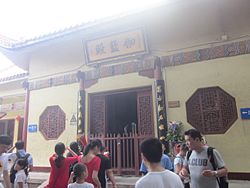| Hall of Sangharama Palace | |||||||
|---|---|---|---|---|---|---|---|
 The Hall of Sangharama Palace at Hongfa Temple, in Shenzhen, Guangdong, China. The Hall of Sangharama Palace at Hongfa Temple, in Shenzhen, Guangdong, China. | |||||||
| Traditional Chinese | 伽藍殿 | ||||||
| Simplified Chinese | 伽蓝殿 | ||||||
| Literal meaning | Hall of Sangharama Palace | ||||||
| |||||||
The Hall of Sangharama Palace is an important building in Han Chinese Buddhist temples. It is the east annex hall of the Mahavira Hall. The term "Sangharama" (僧伽藍摩) refers to "gardens of monks" (眾園). In Buddhism, it originally refers to constructing the base of monks' dormitories (僧舍) and later it refers to the general term of temples, including land and buildings.
Description
Ancient India
In the Hall of Sangharama Palace, King Pasenadi, Prince Jeta and Anathapindika are enshrined. They created the grand Jetavana Vihara (祇園精舍) for the Buddha to live and preach, which was a significant contribution to the creation and spread of Buddhism. So they were regarded as Sangharama God, namely the guardian of the land.
China
In Chinese Buddhism, general Guan Yu in the Three Kingdoms period (220–280) is often enshrined in the Hall of Sangharama Palace. It is recorded that in the Sui dynasty (581–618), when the founder of the Tiantai school, master Zhiyi was in Yuquan Mountain in Jingzhou, Hubei, he saw many strange monsters. A deity with long beard who claimed to be Guan Yu appeared and talked to him. Zhiyi preached Buddha Dharma to him, which moved him and he finally devoted himself to Buddhism and became the Dharmapalas of Buddha. Including Guan Yu as Dharmapalas of Buddha promoted the spread of Buddhism in China.
References
- ^ Zi Yan (2012-08-01). Famous Temples in China. Beijing: Time Publishing and Media Co., Ltd. pp. 35–37. ISBN 978-7-5461-3146-7.
- ^ Wei Ran (2012-06-01). Buddhist Buildings. Beijing: China Architecture & Building Press. ISBN 9787112142880.
- ^ Han Xin (2006-04-01). Well-Known Temples of China. Shanghai: The Eastern Publishing Co. Ltd. ISBN 7506024772.
Further reading
- Wang Guixiang (2016-06-17). 《中国汉传佛教建筑史——佛寺的建造、分布与寺院格局、建筑类型及其变迁》 [The History of Chinese Buddhist Temples] (in Chinese). Beijing: Tsinghua University Press. ISBN 9787302427056.
- Zhang Yuhuan (2014-06-01). 《图解中国佛教建筑、寺院系列》 (in Chinese). Beijing: Contemporary China Publishing House. ISBN 9787515401188.